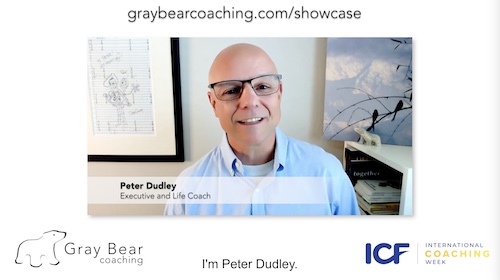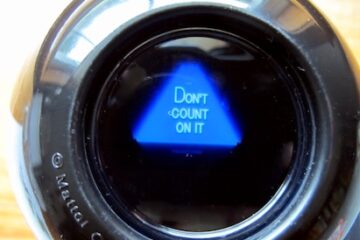Using self-awareness to erase fear of change—a brain-twisting approach to expand your perspective
As I predicted in last week’s post, I’m still processing the disappointment from losing a deal I’d been working on. In this week’s post, I share further wisdom I’m gaining as I continue to work through it.
After writing last week’s piece, I met with a coach (yes, I frequently get coaching from other professionals). During that session, I realized two things:
- I was holding on to perceived negatives, which was clouding my view of potential positives.
- My disappointment stemmed from the feeling that I’d lost something that I never actually had.
This morning, one of the newsletters I subscribe to had a lot to say about loss aversion. Loss aversion is the idea that we feel the pain of loss harder than we feel the joy of gain.
This is a concept I’ve thought a lot about in recent years, when pondering America’s obsession with wealth accumulation. Americans have a constant desire for more. (I know, hashtag not all Americans. I’m with you.)
It seems such a strange thing—the richer someone gets, the more they hate taxes, the more they complain about funding social programs, and the more they want to protect what they have from everyone else. Even when they have far more than what they would call enough, they are terrified of losing even a tiny bit of it.
It turns out that gaining a lot of wealth brings some joy, but the thought of losing any at all feels so much more painful than if you’d never had it to begin with.
And so it was with the disappointment I wrote about last week:
Once I started thinking I had the deal, I started to fear losing it. Only when I began imagining it as “mine” did my mind turn from happiness at the prospect of getting it, to an intense fear of losing it.
And the kicker: My life is essentially unchanged from where it would have been today if this had never even come up. Like, if I had a piece of paper, drew a picture on it, and someone erased the picture. I would still have the same blank piece of paper I started with.
It seems kind of screwed up to be too upset about that, when I really think about it.
Yet it happens to everyone. ALL. THE. TIME.

Optimists, pessimists, and the fear of change
I think I’m a person who generally embraces change and is comfortable with ambiguity.
I’ve known a number of people who are terrified of change. They’re profoundly uncomfortable when they don’t have 100% predictability.
There is nothing wrong with those people. They have other strengths, and their fear of change can provide a healthy check against a freewheeling, wild-west, foolhardy culture.
Yet the greatest inventions and growth come during times of great upheaval. Turmoil spurs creativity not just because it creates problems that need solving, but because turmoil disrupts the status quo. It challenges people to examine their limiting beliefs and understandings, and in so doing it makes room for new ideas and completely new ways of thinking.
The pessimist sees difficulty in every opportunity. The optimist sees opportunity in every difficulty.
Winston Churchill
What I don’t like about Winston’s witticism is that it divides people into two groups, then labels and appears to judge them. On its surface, he seems to be saying that optimists are more versatile than pessimists.
What I do like about that quote, though, is that it recognizes that every opportunity carries some difficulty, and every difficulty carries some opportunity. Winston is saying that different types of people see the same situation in different, but equally valid, ways.
When you take it that way, it seems not to be about optimists versus pessimists, but about unbiased awareness. Recognize that both opportunity and difficulty are complex, and you’ll likely see things more clearly and therefore end up making better decisions.

I don’t believe that pessimists fear change any more than optimists do. Optimists are not more courageous than pessimists.
Pessimists look at coming change and consider all the things that might go badly. Optimists look at coming change and consider all the things that could go well.
In my personal, anecdotal experience, pessimists tend to be better at planning for contingencies, and optimists tend to be better at acting on perceived opportunity. And we all have a little of each within us.
Having a mix of perspectives to see a situation from different angles will give you the most complete understanding of the truth. That’s what I mean by unbiased awareness.
But looking at things from new angles is hard without some kind of disruption or external input. That’s why I turned to a coach to help me go beyond where I could go on my own.
Creating something new through the destruction of something else
Achieving awareness sometimes takes some brain twisting.
One of my favorite brain twists is this piece of blank paper.
Nearly a hundred years ago, artist Robert Rauschenberg acquired a famous drawing by a famous artist… and he erased it.
He erased it.
He took an eraser, he took the drawing, and he painstakingly, persistently, and precisely erased every scratch, scrawl, and smudge.
Some critics called this an act of vandalism.
Then Rauschenberg framed the newly blank paper, named it ERASED DE KOONING DRAWING, and hung it up as a new piece of art.
In naming and framing it, he claimed that he had created something new.
While the blank paper may not be terribly interesting to look at, it is wonderful to contemplate. What questions come up for you? How might this make you view art differently? How does it affect your understanding of what constitutes a creative act versus a destructive act? How might you see the loss of something precious differently?
And how do you perceive the value of the thing that feels lost but was never actually yours during its temporary existence?
It was a drawing I never saw. It is a thing I would never even have known to be sad about if Rauschenberg hadn’t told me it had been erased. It would simply be a blank paper, raising no feelings in me whatsoever.
It started as a blank paper. Someone drew a picture on it. Someone erased it. It’s still a blank paper.
It seems kind of screwed up to be upset about the loss of a picture I never even saw, isn’t it?
Awareness as the way to beat the fear of change
By now, you might see how Rauschenberg’s erasure is a bit like my deal that fell through.
I had built up the deal in my mind into this great big thing, and then someone destroyed it.
But twist your brain: someone didn’t destroy it; they created an erasure of it.
There was a blank page before, and there is a blank page now.
In the short time between, something existed. That thing will leave some trace, as de Kooning’s original drawing did. That residue and the act of erasure have changed the page. Just like the creation and destruction of my deal will leave their mark on me, in some small way.
But now I see the process from multiple angles, and I think about the before and after in different terms. I understand how loss aversion colors my emotions about it.
This awareness gives me the power to choose how this episode will affect me going forward.
For many people, the fear of change comes down to the simple idea that things will never be the same.
And that’s a truth. Even when something looks on the outside like it’s the same, there is no true “undo” in the real world. Something exists between the act and the undo. Something that will leave its mark.
So, what am I saying about fearing change?
On the one hand, change cannot be truly undone. Things will never be the same, even when they look the same on the surface. Fearing the inevitable is a waste of energy.
On the other hand, nothing new can ever be created if nothing changes. The opportunity for growth exists in turmoil. Change is required for growth. Fearing opportunity is counterproductive.
Fear is a difficult and stubborn thing, and rarely does “get over it” actually help. What can lead to overcoming fear, though, is perspective.
Perspective comes from approaching a topic with an open mind, and trying to view it from different angles, with different perspectives, and even perhaps using different language. Throw in a disruptive brain twist for good measure.
And, whether you’re pessimism-dominant or optimism-dominant, make sure not to let either blur your perspective along the way.
I can help
Helping you see things from different perspectives, and helping you answer questions you never even thought to ask, are important roles of a professional coach.
Working with a coach can get you past roadblocks, bring new perspective, overcome inertia, move past disappointment, get you through change.
It’s what I love most about coaching. I love helping people expand their perspective to see a more complete truth, and helping them decide their most authentic and successful way to move forward.
Schedule some time with me to talk about whatever you’re facing. I’m pretty sure I can help, but if I’m not the right coach for you then I am happy to refer you to other great coaches I know.
Stay tuned for next week
Speaking of other great coaches, next week (International Coaching Week) I kick off a series of interviews where I ask coaches about the benefits and impacts of professional coaching.




0 Comments